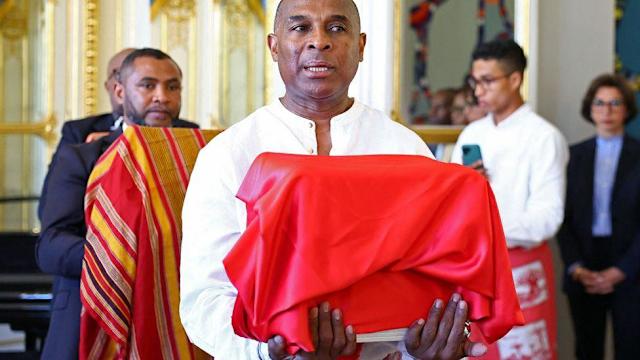France Hands Over Slain King’s Skull to Madagascar in what historians call one of the most symbolic acts of colonial reconciliation in decades. The repatriation of the remains of a monarch killed during France’s colonial conquest is not just about bones—it is about memory, dignity, and justice for an island that endured over a century of domination.
For Madagascar, the return of the skull of their slain king is a moment of closure, a rewriting of colonial history, and a chance to restore pride to a nation whose sovereignty was stripped away in the late 19th century.
The Story Behind the Slain King
To understand why this repatriation matters so deeply, one must revisit the late 1800s, when France expanded its empire into Madagascar. The monarch—whose skull has now been returned—was killed during violent colonial confrontations. His remains were taken to France, where they remained locked in collections and museums, often treated as objects rather than as the sacred remains of a national leader.
For Malagasy people, this was not only a personal tragedy but also a national humiliation. The absence of their king’s remains represented a wound that generations carried silently.
Why France Handed Over the Skull Now
France Hands Over Slain King’s Skull to Madagascar after years of political negotiations, diplomatic pressure, and cultural advocacy. The move comes amid a broader European reckoning with colonial history. In recent years, countries like Belgium, Germany, and the United Kingdom have faced calls to repatriate stolen artifacts and human remains.
French President Emmanuel Macron had pledged in multiple speeches that France must address the “unhealed wounds of colonialism.” The return of Madagascar’s monarch’s skull is part of this new narrative of accountability.
Symbolism and Emotional Impact
For Madagascar, this is more than just the recovery of a relic. It is a restoration of dignity. Many Malagasy people describe the moment as a homecoming of their ancestor, a way to rewrite history with justice and pride.
Eyewitnesses at the ceremonial handover reported tears, prayers, and traditional rituals being performed to welcome the king’s remains back to his homeland. Local leaders described it as “a new dawn for Madagascar.”
5 Key Facts About the Historic Repatriation
The Skull Belonged to a Monarch – The remains are believed to be that of a Malagasy king killed during France’s colonial expansion in the late 19th century.
Kept in France for Over a Century – The skull was housed in French institutions and collections for decades.
Part of a Larger Colonial Reckoning – France has faced growing international pressure to return both artifacts and remains from its colonies.
A Moment of National Healing – Malagasy leaders called the handover a step toward historical justice and reconciliation.
Sets a Precedent – This could encourage other former colonies to demand the return of remains and treasures taken during colonization.
The Ceremony in Madagascar
The ceremony marking the repatriation was held with full state honors. Cultural rituals were performed to ensure the spirit of the king was welcomed back properly. Traditional chants, songs, and dances were carried out, blending the sacred with the political.
Thousands gathered to pay their respects, with many describing it as one of the most historic days in modern Malagasy history.
The Global Context
France Hands Over Slain King’s Skull to Madagascar in a context where many former colonies are reclaiming stolen heritage. From the Benin Bronzes being returned by museums in Europe to Egypt demanding the repatriation of mummies, the global movement for cultural justice is gaining momentum.
International experts note that this move is not just about history—it’s about redefining global power dynamics, acknowledging past wrongs, and building a future based on equality and respect.
France’s Reckoning with Its Colonial Past
France has long struggled with its colonial legacy. From Algeria to West Africa, and from the Pacific Islands to the Caribbean, the shadow of colonial exploitation looms large. This repatriation marks a rare and visible acknowledgment of those wounds.
Historians believe this could pave the way for more official apologies, reparations, or returns of artifacts still sitting in French museums.
Expert Reactions
Dr. Jean-Paul Lefèvre, historian of colonial studies: “This act is symbolic, but symbols matter. Returning a king’s skull is France admitting that history was stolen along with lives and sovereignty.”
Professor Aina Rakoto, Malagasy cultural expert: “We cannot bring back the past, but we can restore dignity. This moment is about healing and justice.”
Why This Matters for Madagascar’s Future
France Hands Over Slain King’s Skull to Madagascar at a time when the country faces economic and social challenges. The symbolic gesture may unify the nation around cultural pride and historical memory.
For young Malagasy citizens, it is also a lesson in resilience: history can be painful, but it can also be rewritten through persistence and dignity.
FAQs
Whose skull was returned to Madagascar?
The skull belonged to a Malagasy monarch killed during France’s colonial expansion in the late 19th century.
Why was the skull kept in France for so long?
It was taken during colonial times and kept in French collections as part of anthropology and museum archives.
Why did France return the skull now?
France is under increasing global pressure to address its colonial past, and the return is part of a broader effort at reconciliation.
What does this mean for Madagascar?
It restores cultural dignity, unites the nation, and honors the memory of a slain leader.
Could this lead to more repatriations?
Yes, experts believe this sets a precedent for other former colonies demanding the return of human remains and cultural artifacts.
Conclusion
The fact that France Hands Over Slain King’s Skull to Madagascar is not just about bones or ceremonies—it is about reclaiming identity, rewriting history, and honoring the legacy of those who resisted colonization.
As Madagascar buries its king with dignity, the act serves as a reminder that colonial wounds may heal slowly, but justice can still be pursued generations later. This is not the end of history but the beginning of a new chapter—one written on Madagascar’s terms.













